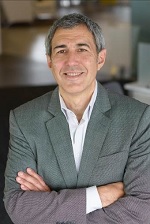 |
| Synlogic CEO Jose-Carlos Gutiérrez-Ramos |
Jose-Carlos "JC" Gutiérrez-Ramos is keeping his startup biotech right on track.
Since leaving his post as a senior R&D exec at Pfizer's ($PFE) Cambridge, MA, hub and casting his lot with the startup Synlogic 8 months ago, Gutiérrez-Ramos completed the company's first collaboration with AbbVie ($ABBV) just days ago and has now rounded up $40 million in a Series B that will pay for the next leg of the journey, putting two drugs through a proof-of-concept test that he hopes will leave the biotech on the threshold of registration studies.
The company's deal with AbbVie covered a major market condition, inflammatory bowel disease, which still leaves the CEO with room for at least one more partnership in the near future. Then there are two lead in-house programs for orphan diseases: urea cycle disorder and phenylketonuria. Gutiérrez-Ramos and his 35-member staff will complete preclinical work this year with an eye to executing two studies in 2017.
To complete that task, he's now raised a total of $70 million from a short list of marquee investors backing a synthetic biology drug platform aimed at the microbiome--a new focus in biopharma that has inspired a slate of startups in the past two years. OrbiMed HealthCare Fund Management led the round, with contributions from Deerfield Management Company and founding investors Atlas Venture and New Enterprise Associates.
Based on his lengthy track record in Big Pharma, Gutiérrez-Ramos tells me that it makes sense to partner on broad fields like inflammatory and metabolic diseases with a deep-pocketed player while keeping orphan indications in house. The two trials set to start next year are affordable enough for a small company, and promising data would leave the company on the threshold of registration studies. In the meantime the biotech has a chance to use its platform technology to expand the pipeline and further test the industry's appetite for new collaborations, he adds, "probably metabolic disease or another inflammatory condition."
At that point they can assess what options they have on raising the rest of the cash needed to go forward.
Once in the clinic, the CEO says Synlogic will be testing a regular dose in patients.
"We want to make sure the patients have a dose every day," says Gutiérrez-Ramos, confident that the pharmacology and manufacturing process will not likely be a problem because of the probiotic material they're working with. The big idea at Synlogic is that its scientists can use a probiotic bacteria like E. coli Nissle to engineer into a "synthetic biotic" that can fix a problem that originates in the complex environment of the gut.
"I believe that synthetic biology can really change medicine," the CEO adds. And now he has the cash in hand to test that belief in humans.
Synlogic is also a test case for a classic biotech startup plan. Investors have been wooing a lineup of research experts from big companies to run these new wave companies. Briggs Morrison left AstraZeneca ($AZN) to run his own company, for example, while Doug Williams bid adieu to Biogen ($BIIB) to return to the helm of his own biotech venture.
Who knows, says the Synlogic CEO. Maybe in 5 or 10 years he'll go back to Big Pharma. But this permeability in biotech and pharma, he adds, the exchange of talent and sharing of new experiences, is good for him and it's good for the industry.
- read the statement